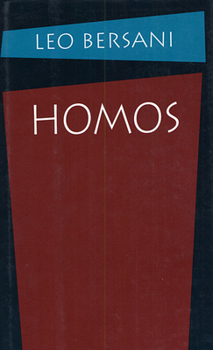Homos
Select Format
Select Condition 
Book Overview
Acclaimed for his intricate, incisive, and often controversial explorations of art, literature, and society, Leo Bersani now addresses homosexuality in America.
Hardly a day goes by without the media focusing an often sympathetic beam on gay life--and, with AIDS, on gay death. Gay plays on Broadway, big book awards to authors writing on gay subjects, Hollywood movies with gay themes, gay and lesbian studies at dozens of universities, openly gay columnists and even editors at national mainstream publications, political leaders speaking in favor of gay rights: it seems that straight America has finally begun to listen to homosexual America. Still, Bersani notes, not only has homophobia grown more virulent, but many gay men and lesbians themselves are reluctant to be identified as homosexuals. In Homos, he studies the historical, political, and philosophical grounds for the current distrust, within the gay community, of self-identifying moves, for the paradoxical desire to be invisibly visible. While acknowledging the dangers of any kind of group identification (if you can be singled out, you can be disciplined), Bersani argues for a bolder presentation of what it means to be gay. In their justifiable suspicion of labels, gay men and lesbians have nearly disappeared into their own sophisticated awareness of how they have been socially constructed. By downplaying their sexuality, gays risk self-immolation--they will melt into the stifling culture they had wanted to contest. In his chapters on contemporary queer theory, on Foucault and psychoanalysis, on the politics of sadomasochism, and on the image of "the gay outlaw" in works by Gide, Proust, and Genet, Bersani raises the exciting possibility that same-sex desire by its very nature can disrupt oppressive social orders. His spectacular theory of "homo-ness" will be of interest to straights as well as gays, for it designates a mode of connecting to the world embodied in, but not reducible to, a sexual preference. The gay identity Bersani advocates is more of a force--as such, rather cool to the modest goal of social tolerance for diverse lifestyles--which can lead to a massive redefining of sociality itself, and of what we might expect from human communities.Format:Paperback
Language:English
ISBN:0674406206
ISBN13:9780674406209
Release Date:October 1996
Publisher:Harvard University Press
Length:218 Pages
Weight:0.55 lbs.
Dimensions:0.6" x 5.1" x 8.3"
Customer Reviews
2 ratings
The Irruptive Force of Gay Identity
Published by Thriftbooks.com User , 16 years ago
Bersani's *Homos* is arguably the most underappreciated text in the academic canon of queer theory. The book is not only the foundation for the "no future" turn in the field but also one of the earliest critiques of gay and lesbian visibility in American culture and politics. In a twist to the conventional logic that motivates gay rights activism, Bersani contends that the drive toward visibility, representation, and tolerance has denuded gay identity as such of its sexually specific character (i.e., the "desire for the same"). It's as though gay rights activism has had to mute its erotic lifeworld in order to gain respectability in American society. Bersani suggests the trade off isn't worth it, in part because such a pact doesn't challenge power relations in toto, thus leaving the door open for future homophobic attacks. Along with mainstream gay rights activism, Bersani is concerned to identify how then-emergent trends in queer theory seemed to follow the liberal/tolerance script. Indeed the book's most insightful moments inhere in Bersani showing how queer theory elides the specificity of same-sex desire in courting "subversive" notions of sexual practice. In withering critiques of Judith Butler, *Paris Is Burning*, and S/M culture, Bersani says that queer theory has made a fetish of the micro-politics of performance and given up on a wholesale challenge to the structures of power by way of same-sex desire. Bersani's readings are refreshing because they take queer politics to task from a standpoint of wanting to radicalize it -- and to do so through gay erotics, not platitudes about how queerness works against the "system." *Homos* elaborates on Bersani's controversial but brilliant essay "Is the Rectum a Grave?" (1988). The book is not as precise in its theoretical argument as I wanted it to be, which is why I'm giving it four stars. For those who want Bersani's essential point in a compact form, I recommend going to the essay before the book. Still, *Homos* deserves extended study and revisiting among scholars interested in queer theory, gay and lesbian studies, and contemporary social critique.
Absolute Genius! Assimilationists look out!
Published by Thriftbooks.com User , 23 years ago
This is the most reasonable, well organized work on gay political culture in existence. Bersani delves beyaonf the rhetoric, and into the psyche of society and the gay culture, making clear why "de-gaying gayness" is a travesty to all parts of society. It is a must reaa for anyone grappling with their sense of society, belonging, be-ing.






